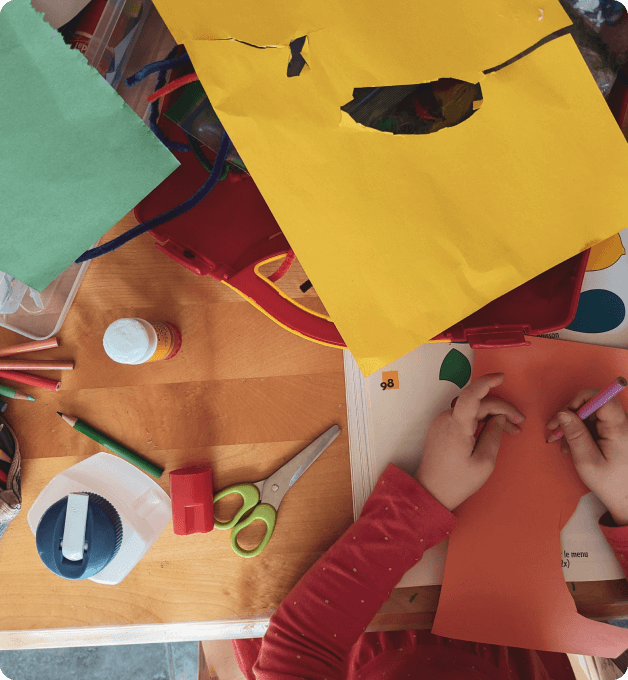Private Tutors and Coaches for Students with Dyslexia
-
Verified and vetted educators
-
Compassionate support
-
Sessions start from £80

How Dyslexia Affects Learning In Students
-
Reading Difficulties
Dyslexic students struggle with phonemic and phonological awareness. Phonemic awareness is the ability to understand and manipulate individual sounds or phonemes within the spoken word. Phonological awareness is the ability to recognise and manipulate the spoken parts of words. Dyslexic students may read slowly and struggle with fluency, comprehension, and understanding complex texts. For example, a child with dyslexia may know the sound each individual letter makes but struggle to blend them together to form the whole word. These issues are not because of a lack of practice or effort but are part of how the dyslexic brain works. Dyslexic students may struggle with reading aloud in class, and may also experience slow reading speed and comprehension errors due to word skipping or misreading.
-
Spelling Difficulties
Spelling is one of the most common areas of difficulty for both children and adults with dyslexia. It isn't yet understood exactly why this is the case. However, as dyslexia impacts memory and phonological processing, it's likely that dyslexic people struggle to break words down into smaller components in order to work out how to spell them, and struggle with memorising which letters represent the sounds within each word. Learning correct spelling by rote may also be challenging due to the impact dyslexia has on memory.
-
Writing Difficulties
Dyslexic students may struggle with written tasks due to dyslexia's impact on phonemic and pholological awareness, memory and organisation. In addition, dyslexic brains are particularly well-suited to non-verbal conceptualisation - thinking with mental pictures of ideas rather than verbal conceptualisation - thinking with the sounds of words . Trying to capture these three-dimentional thoughts in language is often a highly frustrating experience, leading to an incomplete written rendition of the ideas the student wished to convey.
-
Maths Difficulties
According to the British Dyslexia Association, 60% of dyslexic learners also have maths learning difficulties. This is partly due to the way in which dyslexia affects both short and long term memory, challenges with processing speed, and difficulty with sequencing and following procedures. Mathematical terminology and language may also be confusing if the teacher is unable to explain their meaning in a way that can be clearly understood by the student.
-
Self-esteem and Motivation
Dyslexia is a neurological condition which affects language processing, but has no impact on intellectual ability. However, when a dyslexic student faces daily struggles in the classroom exacerbated by unmet learning needs, they often lose self-confidence and belief in their academic ability. Dyslexic students often struggle with motivation and self-esteem because they face ongoing challenges that make tasks such as reading and writing (which dominate in the classroom) more difficult than for their non-dyslexic peers. Particularly before diagnosis, dyslexic students may be told to "try harder" in class, when in fact they are expending significant effort. Negative academic feedback and slower progress can lead to feelings of frustration and self-doubt, making them believe they aren’t capable, even when they try hard. Over time, this can cause them to lose confidence in their abilities, affecting their willingness to engage with schoolwork or new challenges.
-
Processing Speed
Dyslexic students often have a slower processing speed than their neurotypical peers. This has nothing to do with intelligence, but rather how quickly one can take in, process and use information. Linguistic processing is particularly impacted in dyslexic students, meaning they may require extra time to take in verbal or written information and formulate a response. Being put 'on the spot' in class may create stress and anxiety for a dyslexic student if they feel pressured to respond more quickly than they can process.
Supporting Students With Dyslexia
-
Understand Dyslexia
Knowing more about dyslexia helps teachers, tutors and parents tailor their approach for assisting students in addressing their specific strengths and weaknesses. Consulting with professionals such as educational psychologists, speech therapists and reading specialists can also be beneficial in comprehending the student’s situation.
-
Use Multi-Sensory Learning Techniques
Multi-sensory learning techniques have been proven to benefit all learners, but are especially helpful to dyslexic learners as it helps to harness their three-dimentional "mind's eye" style of thinking. Multi-sensory teaching requires use of multiple senses to be engaged within the learning environment in order to make information more digestible and memorable for students. For example, including tactile and kinesthetic input when teaching reading and writing skills helps students to engage with the physical feeling in the lips, tongue and jaw of how each letter and phoneme are pronounced and how it feels to write those letters by hand. This helps reinforce the information, creating stronger long-term memories and improving information recall.
-
Use Visual Aids and Assistive Technology
Visual aids such as mind-maps, diagrams and drawings are generally much better suited to dyslexic learners than standard written notes, due to their increased visual impact. Coloured overlays for printed texts or coloured filters for reading on-screen can reduce glare and make reading more comfortable. Listening to audio-books while following along with the text can help some students develop their reading comprehension. Assistive technology such as speech-to-text tools, spelling and grammar apps and mind-mapping software can also be incredibly helpful for dyslexic students.
-
Encourage Regular Breaks
Regular breaks help rest and recharge the brain. Short breaks during study time (as well as longer breaks taken when possible) are vital in order to prevent overwhelm and maintain steady progress, energy and motivation. Encourage dyslexic students to take movement breaks after long periods of being seated, and to pursue hobbies and interests outside of school and study time, as these help to recharge the brain and cultivate higher levels of self-esteem in students.
-
Offer Encouragement and Support
Encouraging and supporting dyslexic students is vital to boost their confidence and reduce feelings of frustration. A supportive environment at school and at home helps dyslexic students feel understood and accepted, helping them to persist through challenges and find enthusiasm for learning.
-
Individual Support
Each dyslexic student has their own unique brain wiring, and their own individual strengths, challenges, and passions. Tailoring support to the individual will create the optimal learning environment they need to thrive and meet their academic potential.
How Can A Dyslexia Tutor Help?
-
Understand Dyslexia
We help educate all people about dyslexia. Dyslexia tutors help by providing tailored instruction that aligns with the student's unique learning style. Our tutoprs use a range of dyslexia-friendly techniques, such as multisensory learning, breaking down complex concepts into manageable steps, using repetition and reinforcement to build confidence and skills. Additionally, they can teach students strategies for coping with challenges related to dyslexia, fostering both academic growth and self-esteem. Consulting with professionals such as expert educators or educational psychologists can also be beneficial in comprehending your child’s situation.
-
Visual Aids and Assistive Technology
Our dyslexia tutors use visual aids when teaching, such as charts, diagrams, and colour-coded materials to make abstract concepts more concrete, creating an engaging, accessible learning environment that caters to the strengths of students with dyslexia. Our tutors may also use assistive technology in their sessions, or recommend effective software, apps and tools that may help with the student's personal study.
-
Encouragement and Support
Dyslexia tutors provide encouragement by celebrating students' progress, big and small, to keep students motivated and confident. We create a supportive learning environment tailored towards leveraging student strengths and creating effective coping strategies for their challenges. With encouragement and support, dyslexic students can grow in self-confidence and find enjoyment in learning.
-
Individual Support
Each dyslexic student is unique, with their own individual strengths, challenges and interests. Our tutors take time to get to know each student, tailoring their methods to best accomodate their learning needs.
-
Customised Learning Plans
We work with students and parents to ensure that their tutoring sessions are tailored to their unique needs. We ensure that they feel academically supported by paying especial attention to areas of challenge within their subject, and always ensure that teaching methods are adapted to suit their individual learning strengths and needs. Each student has their own academic goals, and deserves better than one-size-fits-all tuition!
-
Increased Confidence
A tutor who understands dyslexia can help students understand why their brains struggle with certain activities and provide tutoring methods and coping strategies better suited to accommodating these struggles. On the other side of the coin, a tutor who understands dyslexia also understands the strengths that come with this type of brain-wiring, tailoring teaching methods to allow those strengths to shine. This approach makes dyslexic students feel understood and empowered, increasing their confidence.
The Special Educational Needs Support Experience At Sunbeam Education
-
Understanding And Compassionate Tutors
Our tutors provide individualised expert support, and patience from first-hand experience; we help students thrive academically while encouraging them to grow as individuals.
-
Improve confidence in learning
We work with primary and secondary school, homeschooled and university students to build their confidence in their abilities. We teach through positive reinforcement and compassionate understanding.
-
Reduce emotional distress
We have developed teaching techniques that are designed to reduce stress and anxiety around learning. A calm environment is critical for learning.
How To Hire A Good Tutor For SEN From Sunbeam Education
-
Find A Tutor Who Works For You
Find the perfect tutor by assessing their skills and compatibility. If you can’t decide, feel free to send us a message or schedule a free call.

-
Schedule A Free Introductory Chat
Book a free introductory call with us to discuss options and ask any questions you may have about our process of supporting students with dyslexia.

-
Onboard Your Tutor
As soon as you feel confident in our methods and procedures, you can begin your course immediately by enlisting the help of one of our experts.














